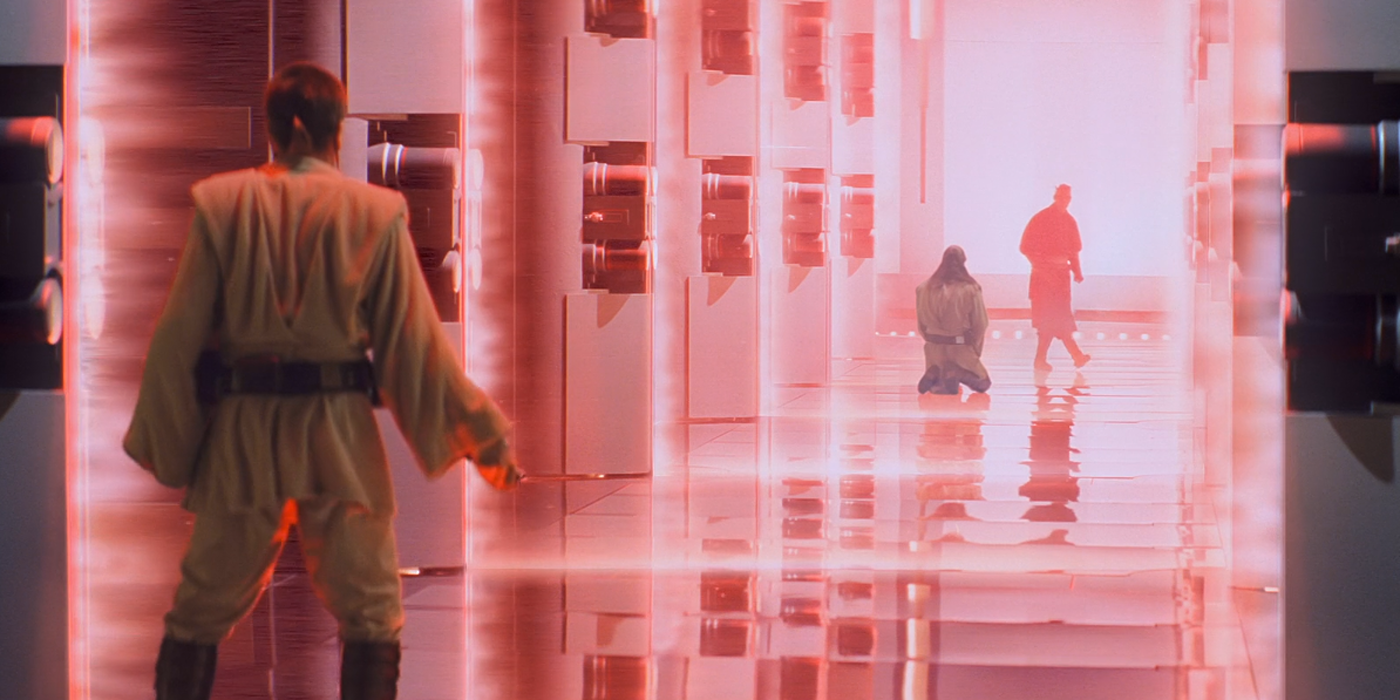Liam Neeson has revealed his true emotions about Qui-Gon Jinn’s loss of life in Star Wars: Episode I – The Phantom Menace. Although The Phantom Menace is commonly considered the worst Star Wars prequel film, there is not any denying its significance to the general franchise. Qui-Gon Jinn’s loss of life by the hands of Darth Maul modified the course of Anakin Skywalker’s life.
Throughout a three-way duel between Jedi Grasp Qui-Gon Jinn, his Padawan, Obi-Wan Kenobi (Ewan McGregor), and Sith apprentice Darth Maul (Ray Park), Qui-Gon Jinn was stabbed by way of the intestine with a lightsaber, dying in Obi-Wan’s arms. Regardless of the grandeur of all of it, Neeson wasn’t impressed together with his character’s loss of life. Throughout an interview with GQ, Neeson described Jinn’s loss of life with vicious honesty:
“I thought my death was a bit namby-pamby. I’m supposed to be a Master Jedi. You know, my character fell for that, ‘Oh, I’m going for your face, no, I’m not, I’m going for your stomach. Oh, you got me!’ Oh, please. Hardly a Master Jedi.”
Qui-Gon Jinn’s Dying Modified Star Wars
Picture through Disney+
Liam Neeson could have felt Jinn’s loss of life was unbecoming of a Jedi Grasp, however it had a serious influence on the story. There is a prevalent concept that if Qui-Gon had lived, Anakin could by no means have turned to the darkish aspect. Qui-Gon was an unconventional Jedi. He wasn’t a rogue, per se, however he believed in historic prophecies and had extra room for emotion.
Anakin was destined to wrestle with grief, concern, anger, and love, and he felt repressed by the Jedi Order and even, at instances, Obi-Wan Kenobi. If the Council had stored their promise and refused Anakin entry, if Qui-Gon had survived, Qui-Gon probably would have left the Order and educated Anakin within the methods of the Drive outdoors the Jedi’s restrictive beliefs.
If Anakin had been free to like, would he have felt the necessity to flip to the darkish aspect? Would Palpatine have had a chance to control him? It is potential, however a lot much less probably.
Our Take On Qui-Gon Jinn’s Dying

And but, regardless of the narrative significance of Qui-Gon Jinn’s loss of life and the “what if” questions it raises, Neeson has some extent. Ought to a Jedi Grasp of Qui-Gon’s degree really have been so simply manipulable throughout that battle? He was targeted, meditating between dueling sprints. Maul was a talented fighter, definitely, however he was defeated by a Padawan quickly after.
Then once more, whereas lightsaber fights are a key a part of Star Wars’ lore, the choreography hasn’t all the time been equally stellar. Through the authentic trilogy, the fights have been restricted by the know-how of the time. When The Phantom Menace was made, there was a have to make the fights appear extra frenetic and fast-paced. Whereas they have been far more charming, there was definitely room for enchancment.
Although Liam Neeson’s reservations are comprehensible, the scene nonetheless holds important weight inside Star Wars’ storytelling. With the mix of three expert lightsaber wielders, John Williams’ iconic Duel of the Fates rating, and the destiny of the galaxy hanging within the steadiness, Qui-Gon Jinn’s loss of life in Star Wars: Episode I – The Phantom Menace remains to be spectacular, irrespective of how “namby-pamby” it might have been.
Supply: GQ on YouTube


